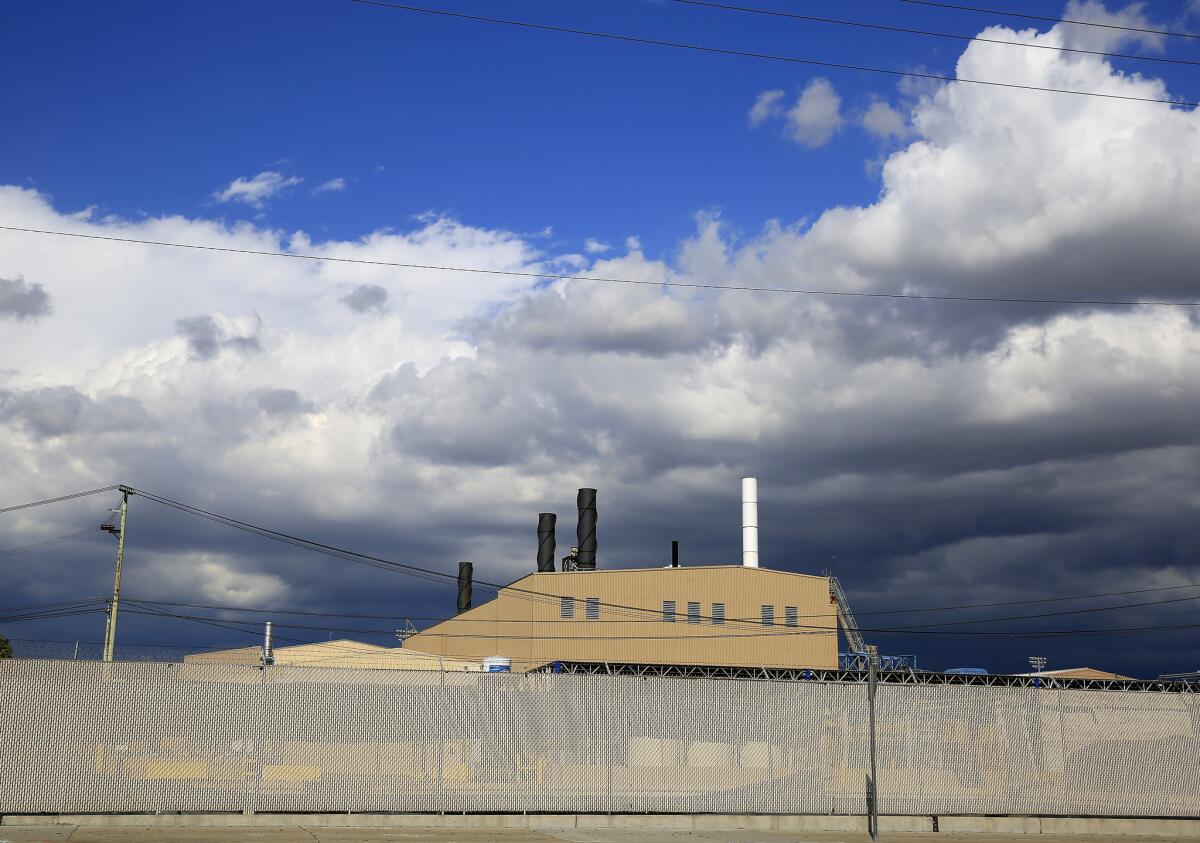Exide cleanup: L.A. County approves $2 million to speed lead removal at homes

The now-shuttered Exide Technologies battery recycling plant in Vernon.
- Share via
Los Angeles County supervisors, frustrated by what they say is a lack of urgency by state officials to clean lead contamination from homes near a shuttered Vernon battery recycler, agreed to spend $2 million to pick up the pace.
The measure adopted Tuesday will not directly fund the removal of the toxic lead dust from homes and yards fouled by decades of air pollution from the Exide Technologies plant.
Instead, by hiring contractors and consultants, the county will “facilitate” the state-run cleanup by doing its own soil testing at 1,000 homes over the next two months and by dispatching community outreach workers to neighborhoods around the plant.
The county will also draft a timeline and strategy to force state regulators, Exide “and other responsible parties to fully fund and undertake this cleanup,” according the motion approved by the five-member board.
The county had to intervene because “the state continues to drag its feet,” said Supervisor Hilda Solis, whose district include Boyle Heights, East Los Angeles and other communities near the battery recycling plant.
“As long as lead is still in the ground and inside the homes, residents will be continually exposed,” she said. “Children can’t play outside in the yard without risking their health.”
In August, the state Department of Toxic Substances Control announced that lead emissions from Exide may have contaminated as many as 10,000 homes across Southeast L.A. County.
Crews have removed soil from 174 homes near the plant since discovering elevated levels of lead, a potent neurotoxin that can cause learning disabilities, lower IQs and other developmental problems in children.
But the state toxics agency has used all but $1 million of $9 million Exide placed in a trust fund for residential cleanup.
“We recognize the need for urgency and have acted quickly,” DTSC spokesman Sandy Nax said in an emailed statement.
Residents on Tuesday faulted the state toxic substances department for a sluggish response to an urgent health problem. They told supervisors that they have waited many months for their homes to be tested and cleaned and believe pollution from Exide has led to learning deficiencies, cancer and other health problems
“We need someone to please take responsibility and come and clean our communities,” said Amelia Vallejo, a preschool teacher from East Los Angeles whose 5-year-old son struggles with his hearing, eyesight and other health problems she believes could be tied to pollution from Exide.
Solis said only 44 homes have been cleaned both inside and out. County health officials say they believe about 1,000 homes could have lead levels above 1,000 parts per million — California’s threshold for hazardous waste.
In a Monday letter to county supervisors, DTSC Director Barbara Lee welcomed the county funds as “invaluable to help stop continuing exposures to lead in the community” but said Solis mischaracterized the number of properties cleaned. The department, she said, has cleaned “the interior of every residence where people have granted DTSC access.
In March, Georgia-based Exide struck a deal with the U.S. attorney’s office to demolish the lead-acid battery smelter and clean nearby homes.
State regulators, who are overseeing the cleanup, allowed the facility to operate for 33 years without a full permit, even as it was cited over and over again for violating hazardous waste laws and for emitting too much lead and arsenic, a carcinogen.
In 2013 the DTSC ordered Exide to begin testing soil in two small areas of Boyle Heights and Maywood that are close to the plant. After finding lead in many of those homes, the agency expanded testing to a wider swath of southeast L.A. County.
Two months ago, the department acknowledged more widespread contamination and pledged $7 million in state funds to expand testing and cleanup of homes.
The county’s plan will start a public outreach campaign in the predominately Latino neighborhoods near the plant. The funds will pay for Spanish-speaking community health workers, or promotoras, to educate residents and encourage them to get their blood tested for lead poisoning and to make use of vouchers to clean lead from the inside of their homes.
The measure authorizes the county to hire the necessary contractors and consultants without competitive bids, citing “the exigency of the health needs in the community.”
It also directs county lawyers by next week to draft recommendations for a “more aggressive legal strategy” that could include action against Exide and its corporate officers. The requirement is similar to a motion county supervisors adopted nearly a year ago that did not result in legal action.
Exide admitted to years of criminal conduct in March, but the company and its employees avoided charges as part of the closure deal with federal prosecutors.
Exide did not comment on the county’s action but issued a statement saying it is meeting its “closure, remedial, and financial obligations,” which include paying $9 million for home cleanup to clean homes and funding a county-administered blood lead testing program.
Cleaning each home costs about $45,000, according to the DTSC. If the cleanup grows to thousands of properties, it would be the largest of its kind California and could cost hundreds of millions of dollars.
For more environment news, follow me @tonybarboza
ALSO:
Boy won’t be arrested after fatally stabbing stepdad to protect mother, police say
Girl’s bloodcurdling screams heard in video as she fights off would-be kidnapper
In Bruce Lee-like move, Northern California police department to adopt nunchakus
More to Read
Sign up for Essential California
The most important California stories and recommendations in your inbox every morning.
You may occasionally receive promotional content from the Los Angeles Times.










